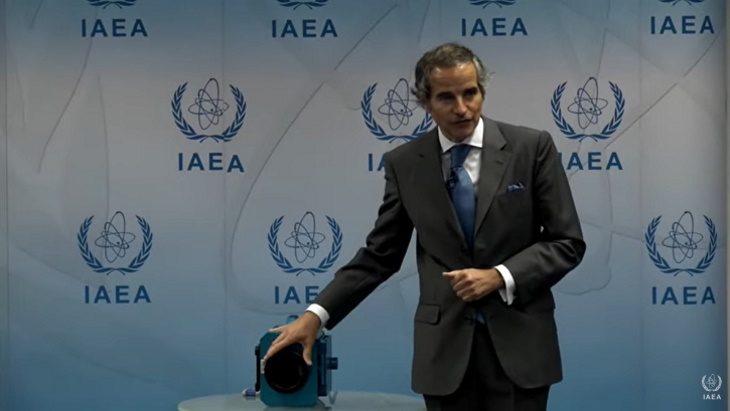"What we have been informed is that 27 cameras … are being removed in Iran, apart from an online enrichment monitoring system that we have over there. This of course poses a serious challenge to our ability to continue working there and to confirm the correctness of Iran's declaration under JCPOA," IAEA Director General Rafael Mariano Grossi said in a 9 June press conference.
"I just informed the Board of Governors about this. Our inspectors will be accompanying these activities over the next few hours in different places in Iran and we will take it from there."
The IAEA had received a "succinct" communication from Iran implying that all extra monitoring equipment installed under the JCPOA - not including around 40 cameras which are covered by Iran's separate Comprehensive Safeguards Agreement and not the JCPOA - will be removed, Grossi told reporters. Iran has already begun deactivating cameras, although removing all 27 will take "some time", he said.
Removal of the equipment does not categorically end any possibility of reconstructing the continuity of knowledge but "very, very close to that - the window of opportunity is very, very small", Grossi said.
He described with situation as "very tense" and said negotiations on the revival of the JCPOA are "at a low ebb", with the bilateral process with Iran to clarify a number of outstanding issues so far being unsuccessful. "My obligation is to persevere, to continue proposing solutions and to continue to propose that we work together with Iran," he said.
Capabilities would need to be reinstated within a space of about 3-4 weeks for the agency to be able to give the JCPOA parties the monitoring accuracy they require. Failure to achieve this would be a "fatal blow", he said.
Grossi said the IAEA had not yet been informed about "additional activities" in Iran. "We know that there is - there has been for some time - a plan to install new capacity and to increase installed capacity," he added.
IAEA resolution
Earlier this week, Grossi told the IAEA's Board of Governors that the agency could not confirm the correctness and completeness of Iran's declarations under its Comprehensive Safeguards Agreement. Addressing the opening session of the board's quarterly meeting on 6 June, he said Iran had not provided "technically credible" explanations relating to the agency's findings at three undeclared locations in Iran, and also said Iran had not informed the IAEA of the current whereabouts of certain nuclear material and/or nuclear-contaminated equipment.
The board subsequently passed a resolution expressing "profound concern" that the safeguards issues relating to three undeclared locations "remain outstanding due to insufficient substantive cooperation by Iran", and calling on Iran "to act on an urgent basis to fulfil its legal obligations and, without delay, take up the Director General's offer of further engagement to clarify and resolve all outstanding safeguards issues".
According to the Mehr news agency, Mohamed Eslami, head of the Atomic Energy Organisation of Iran (AEOI) said on national television on 8 June that the organisation had already "put an end" to the activities of some of the IAEA's cameras. He also said the Iranian nuclear agency has installed new uranium enrichment centrifuges and started injecting gas into them.
The JCPOA was agreed in 2015 between Iran and the so-called P5+1 - the US, UK, France, China, Russia and Germany. Under its terms, Iran agreed to limit its nuclear activities including uranium enrichment over a 15-year period and to allow in international inspectors in return for the lifting of economic sanctions. The USA withdrew from the deal in May 2018. The IAEA is responsible for verifying and monitoring the implementation by Iran of its nuclear-related commitments under the plan.







_55401.png)
_23009.jpg)






